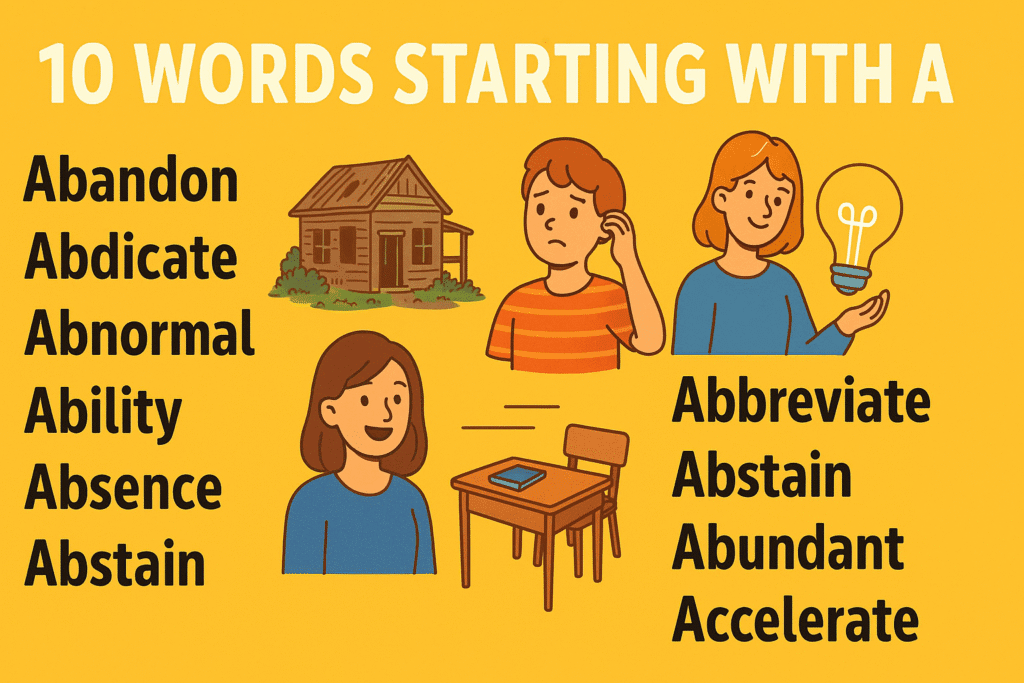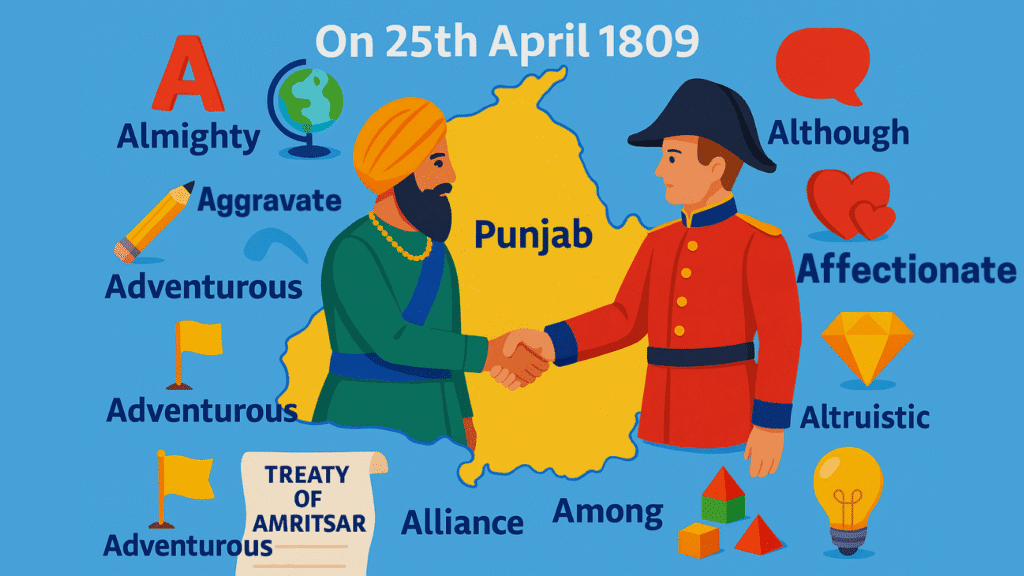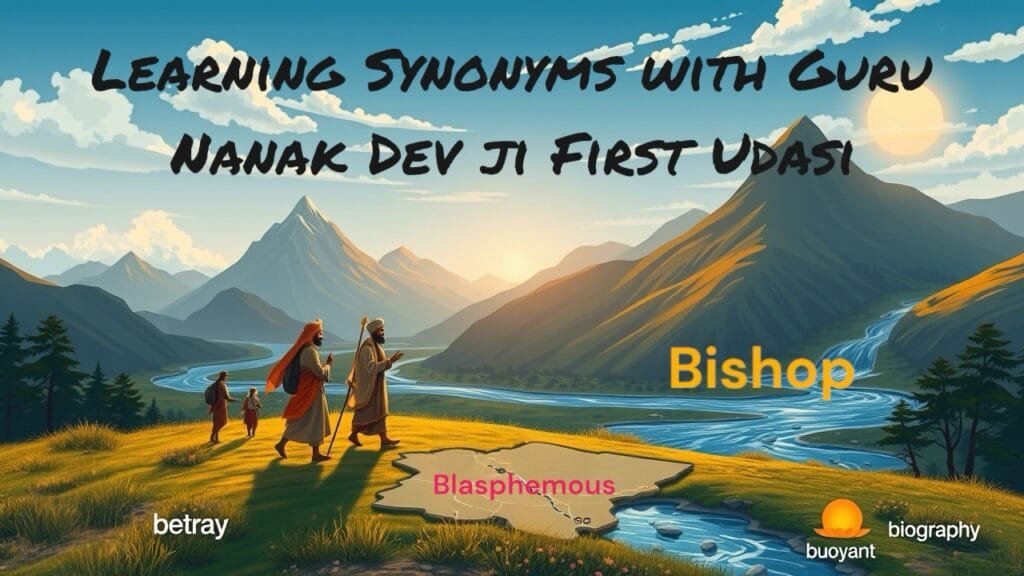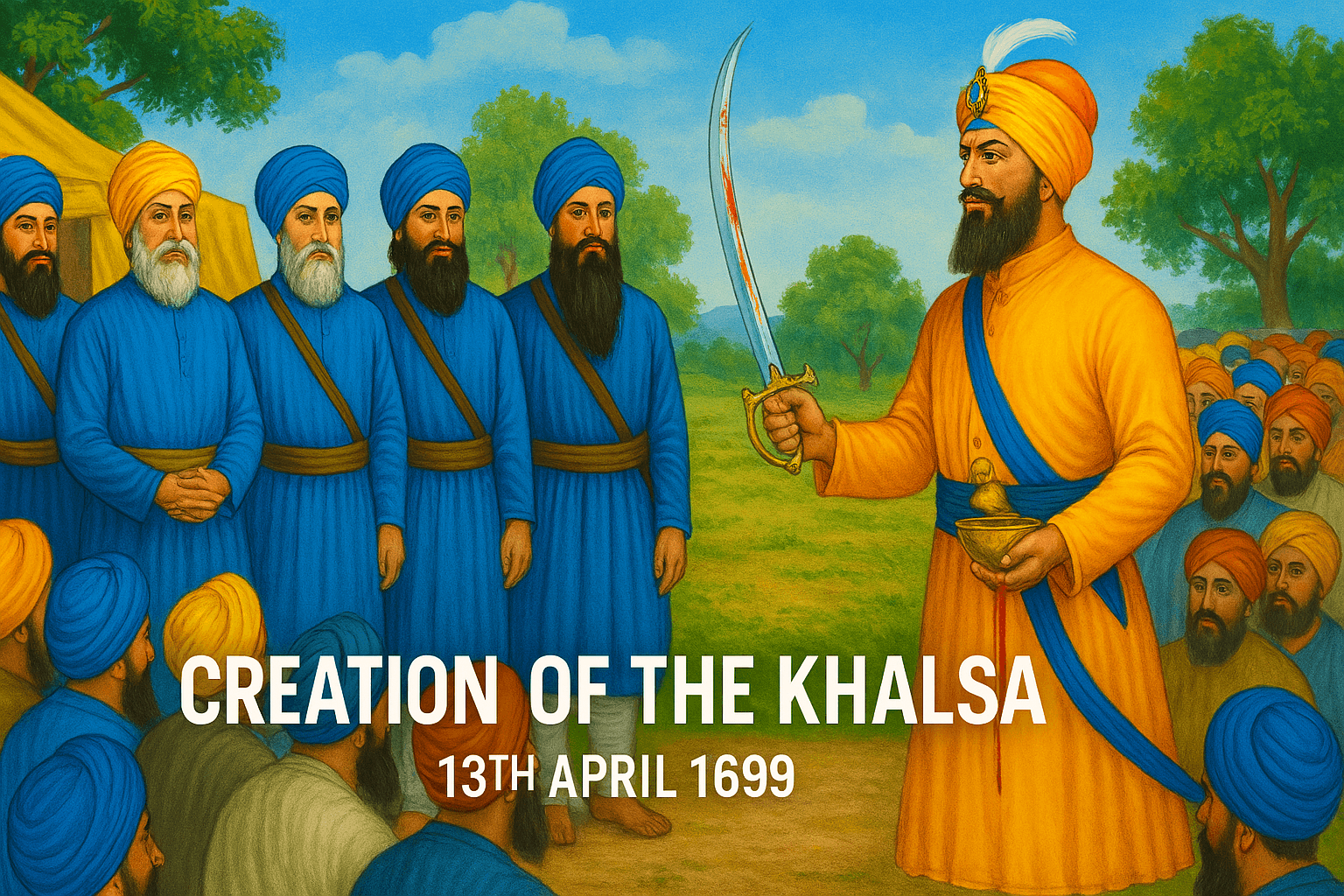
In this article, we continue from our previous piece on synonyms, which introduced a unique and engaging way of learning through storytelling rooted in history of Khalsa Creation. By exploring historical events, we not only understand the contextual meaning of words but also make learning more interesting and memorable.
This method is especially helpful for those preparing for competitive exams like PSSSB, PCS, Punjab Patwari, Excise Inspector, Punjab Police, and others. In this article, we will delve deeper into the story of Guru Gobind Singh Ji and the creation of the Khalsa, using it as a foundation to learn new words and their meanings. This approach not only enhances vocabulary but also connects us to the rich history and culture of Punjab, making it a valuable resource for exam preparation.
Table of Contents
The Creation of Khalsa: A Story of Courage and Faith
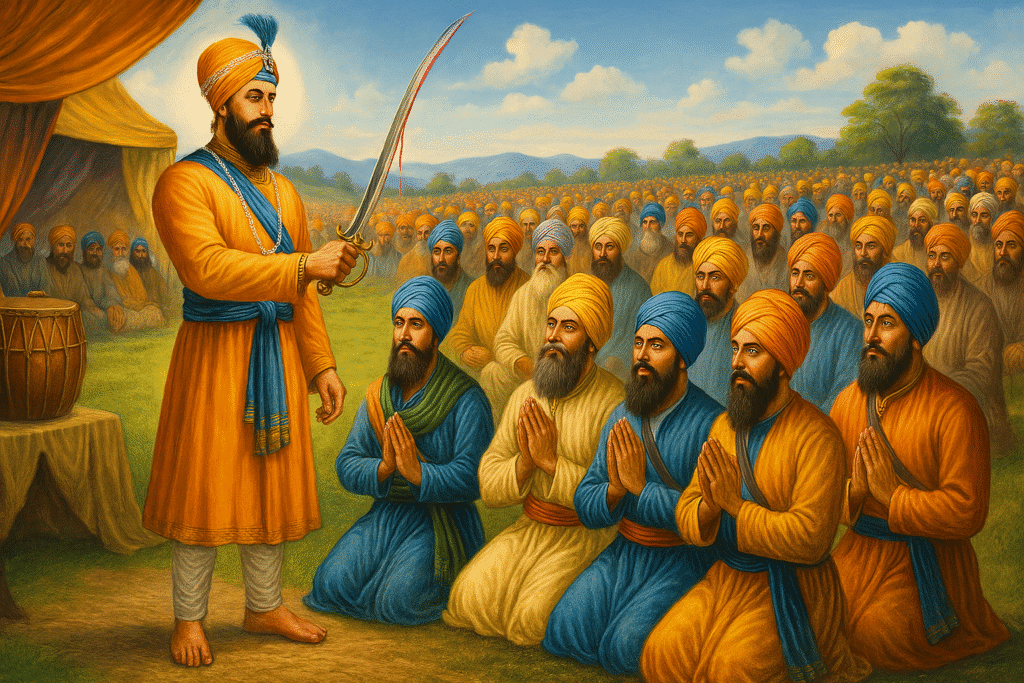
On the 13th of April 1699, a historic event took place in the ancient city of Anandpur Sahib, Punjab. Guru Gobind Singh Ji, the tenth Sikh Guru, called for a special gathering of his followers. The day was Baisakhi, a festival celebrated with joy and enthusiasm. But this day was different. The Guru had a plan that would change the course of history.
The Guru stood before the crowd, his sword shining in the sunlight. He asked for a volunteer who was ready to sacrifice his life for the sake of truth and justice. The crowd fell silent. There was anxiety and anxious murmurs among the people. Who would step forward? The demand seemed impossible, and many felt apathetic, unsure of what to do.
Suddenly, an anonymous man stepped out of the crowd. His name was Bhai Daya Ram, a shopkeeper from Lahore. He walked bravely toward the Guru, ready to offer his life. The Guru took him into a tent. A moment later, the Guru returned alone, his sword stained with blood. He asked for another volunteer. Again, the crowd hesitated, but another brave soul came forward. His name was Bhai Dharam Das, a farmer from Delhi. This happened three more times. The next volunteers were Bhai Mohkam Chand, a tailor from Dwarka; Bhai Himmat Rai, a water-carrier from Jagannath Puri; and Bhai Sahib Chand, a barber from Bidar. Each time, the Guru took a volunteer into the tent and returned alone.
The crowd was filled with antipathy and fear. They wondered why the Guru was doing this. But soon, the truth became apparent. The Guru revealed that the five volunteers were alive and well. They had passed a test of courage and faith. These five men, known as the Panj Pyare (the Five Beloved Ones), became the first members of the Khalsa, a community of saint-soldiers.
Guru Gobind Singh Ji explained that the Khalsa was created to protect the weak and fight against injustice. He gave them a new identity, with the surname “Singh” for men and “Kaur” for women. He also introduced the Five Ks, which are articles of faith that every Khalsa member must wear.
The Guru’s analysis of the situation was clear. He saw that people were divided by caste, religion, and fear. He wanted to create a community where everyone was equal, brave, and devoted to God. The Khalsa was not just a group of warriors; it was a way of life.
The Guru also reminded everyone of their ancestors, who had fought for justice and truth. He said that the Khalsa would continue this legacy. The creation of the Khalsa was not just an event; it was a revolution. It gave people a new sense of purpose and pride.
On that day, Guru Gobind Singh Ji did not ask for an apology from anyone. Instead, he asked for courage, faith, and devotion. He showed that true strength comes from within, and that standing up for what is right is the greatest duty of all.
The creation of the Khalsa on 13th April 1699 is a story of bravery, equality, and faith. It teaches us to be strong, to stand together, and to always fight for justice. This is why the Khalsa is remembered and respected even today. The Panj Pyare—Bhai Daya Ram, Bhai Dharam Das, Bhai Mohkam Chand, Bhai Himmat Rai, and Bhai Sahib Chand—are forever remembered as the first heroes of the Khalsa. Their courage and devotion continue to inspire millions around the world.
Learn Vocabulary Words and Their Meanings through the Story of Khalsa Creation
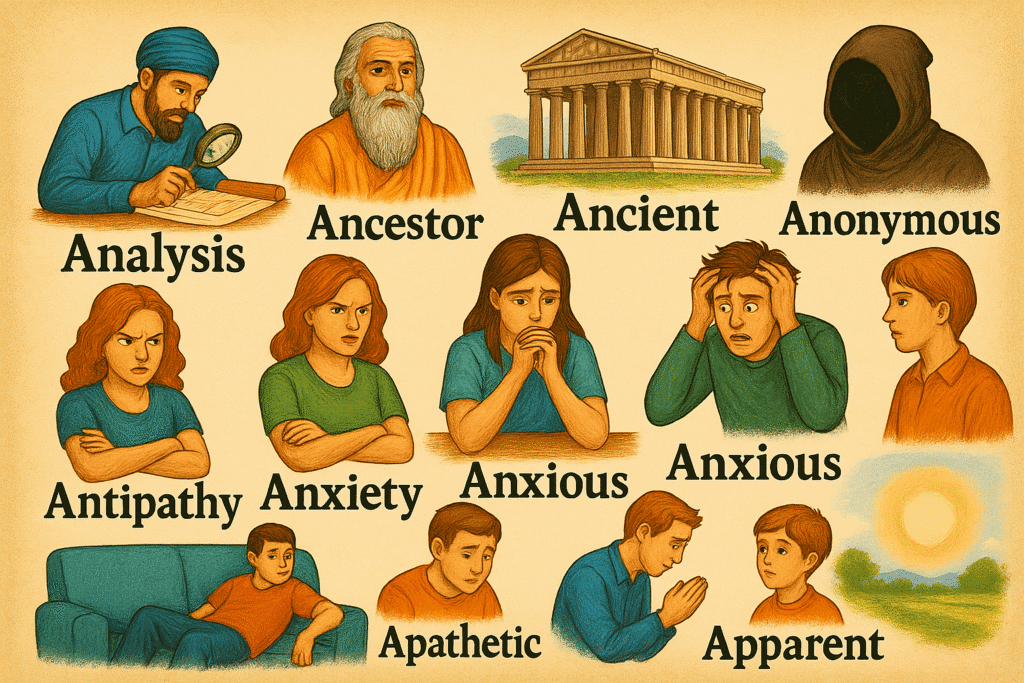
1. Analysis
- Meaning: Detailed examination of something to understand it better.
- Synonyms: Examination, study, evaluation.
- Sentence: The teacher’s analysis of the student’s performance helped improve his grades.
- Punjabi Meaning: ਵਿਸ਼ਲੇਸ਼ਣ (Vishleshan)
- Punjabi Sentence: ਅਧਿਆਪਕ ਦੇ ਵਿਦਿਆਰਥੀ ਦੇ ਪ੍ਰਦਰਸ਼ਨ ਦਾ ਵਿਸ਼ਲੇਸ਼ਣ ਕਰਨ ਨਾਲ ਉਸਦੇ ਨੰਬਰ ਸੁਧਾਰਨ ਵਿੱਚ ਮਦਦ ਮਿਲੀ।
2. Ancestor
- Meaning: A person from whom one is descended, like a grandparent or great-grandparent.
- Synonyms: Forefather, predecessor, forebear.
- Sentence: My ancestors came from a small village in Punjab.
- Punjabi Meaning: ਪੂਰਵਜ (Purvaj)
- Punjabi Sentence: ਮੇਰੇ ਪੂਰਵਜ ਪੰਜਾਬ ਦੇ ਇੱਕ ਛੋਟੇ ਜਿਹੇ ਪਿੰਡ ਤੋਂ ਆਏ ਸਨ।
3. Ancient
- Meaning: Belonging to the very distant past.
- Synonyms: Old, antique, prehistoric.
- Sentence: The ancient ruins of Harappa are a symbol of our rich history.
- Punjabi Meaning: ਪ੍ਰਾਚੀਨ (Pracheen)
- Punjabi Sentence: ਹੜੱਪਾ ਦੇ ਪ੍ਰਾਚੀਨ ਖੰਡਰ ਸਾਡੀ ਸਮ੍ਰਿਧ ਇਤਿਹਾਸ ਦਾ ਪ੍ਰਤੀਕ ਹਨ।
4. Anonymous
- Meaning: Without a name or identity.
- Synonyms: Nameless, unidentified, unknown.
- Sentence: The donation was made by an anonymous person.
- Punjabi Meaning: ਅਣਪਛਾਤਾ (Anpachata)
- Punjabi Sentence: ਦਾਨ ਇੱਕ ਅਣਪਛਾਤੇ ਵਿਅਕਤੀ ਦੁਆਰਾ ਕੀਤਾ ਗਿਆ ਸੀ।
5. Antipathy
- Meaning: A strong feeling of dislike or hatred.
- Synonyms: Hatred, hostility, aversion.
- Sentence: There was a clear antipathy between the two rival teams.
- Punjabi Meaning: ਨਫ਼ਰਤ (Nafrat)
- Punjabi Sentence: ਦੋਵਾਂ ਵਿਰੋਧੀ ਟੀਮਾਂ ਵਿੱਚ ਸਪੱਸ਼ਟ ਨਫ਼ਰਤ ਸੀ।
6. Anxiety
- Meaning: A feeling of worry or fear about something.
- Synonyms: Worry, nervousness, unease.
- Sentence: She felt anxiety before her exam results were announced.
- Punjabi Meaning: ਚਿੰਤਾ (Chinta)
- Punjabi Sentence: ਉਸਨੂੰ ਆਪਣੇ ਇਮਤਿਹਾਨ ਦੇ ਨਤੀਜੇ ਆਉਣ ਤੋਂ ਪਹਿਲਾਂ ਚਿੰਤਾ ਹੋਈ।
7. Anxious
- Meaning: Feeling worried or nervous about something.
- Synonyms: Worried, nervous, uneasy.
- Sentence: He was anxious about his job interview.
- Punjabi Meaning: ਚਿੰਤਾਤੁਰ (Chintatur)
- Punjabi Sentence: ਉਹ ਆਪਣੀ ਨੌਕਰੀ ਇੰਟਰਵਿਊ ਬਾਰੇ ਚਿੰਤਾਤੁਰ ਸੀ।
8. Apathetic
- Meaning: Showing no interest or enthusiasm.
- Synonyms: Indifferent, uninterested, unresponsive.
- Sentence: The students were apathetic about the new school rules.
- Punjabi Meaning: ਉਦਾਸੀਨ (Udaseen)
- Punjabi Sentence: ਵਿਦਿਆਰਥੀ ਸਕੂਲ ਦੇ ਨਵੇਂ ਨਿਯਮਾਂ ਬਾਰੇ ਉਦਾਸੀਨ ਸਨ।
9. Apology
- Meaning: A statement saying sorry for something wrong done.
- Synonyms: Sorry, regret, excuse.
- Sentence: She offered an apology for being late to the meeting.
- Punjabi Meaning: ਮਾਫ਼ੀ (Mafi)
- Punjabi Sentence: ਉਸਨੇ ਮੀਟਿੰਗ ਵਿੱਚ ਦੇਰ ਨਾਲ ਪਹੁੰਚਣ ਲਈ ਮਾਫ਼ੀ ਮੰਗੀ।
10. Apparent
- Meaning: Clearly visible or understood.
- Synonyms: Clear, obvious, evident.
- Sentence: It was apparent that he had worked hard for the project.
- Punjabi Meaning: ਸਪੱਸ਼ਟ (Sapasht)
- Punjabi Sentence: ਇਹ ਸਪੱਸ਼ਟ ਸੀ ਕਿ ਉਸਨੇ ਪ੍ਰੋਜੈਕਟ ਲਈ ਕਠਿਨ ਮਿਹਨਤ ਕੀਤੀ ਸੀ।
Frequently Asked Questions (FAQs)
1. What is the meaning of the word “analysis”?
Answer: Analysis means a detailed examination of something to understand it better.
Example: The analysis of the data helped us solve the problem.
Punjabi Meaning: ਵਿਸ਼ਲੇਸ਼ਣ (Vishleshan)
2. Who is an “ancestor”
Answer: An ancestor is a person from whom one is descended, like a grandparent or great-grandparent.
Example: My ancestors lived in a small village in Punjab.
Punjabi Meaning: ਪੂਰਵਜ (Purvaj)
3. What does “ancient” mean?
Answer: Ancient refers to something belonging to the very distant past.
Example: The ancient city of Harappa is a historical treasure.
Punjabi Meaning: ਪ੍ਰਾਚੀਨ (Pracheen)
4. What is the meaning of “anonymous”?
Answer: Anonymous means without a name or identity.
Example: The writer chose to remain anonymous.
Punjabi Meaning: ਅਣਪਛਾਤਾ (Anpachata)
5. What does “antipathy” mean?
Answer: Antipathy means a strong feeling of dislike or hatred.
Example: There was antipathy between the two rival teams.
Punjabi Meaning: ਨਫ਼ਰਤ (Nafrat)
6. What is “anxiety”?
Answer: Anxiety is a feeling of worry or fear about something.
Example: She felt anxiety before her exam results.
Punjabi Meaning: ਚਿੰਤਾ (Chinta)
7. What does “anxious” mean?
Answer: Anxious means feeling worried or nervous about something.
Example: He was anxious about his job interview.
Punjabi Meaning: ਚਿੰਤਾਤੁਰ (Chintatur)
8. What is the meaning of “apathetic”?
Answer: Apathetic means showing no interest or enthusiasm.
Example: The students were apathetic about the new rules.
Punjabi Meaning: ਉਦਾਸੀਨ (Udaseen)
9. What does “apology” mean?
Answer: Apology means a statement saying sorry for something wrong done.
Example: She offered an apology for being late.
Punjabi Meaning: ਮਾਫ਼ੀ (Mafi)
10. What is the meaning of “apparent”?
Answer: Apparent means something that is clearly visible or understood.
Example: It was apparent that he had worked hard.
Punjabi Meaning: ਸਪੱਸ਼ਟ (Sapasht)

